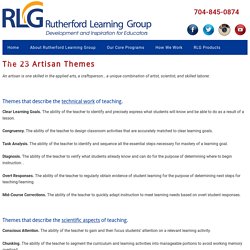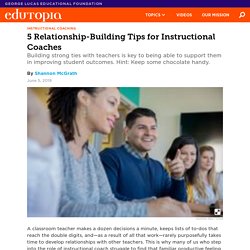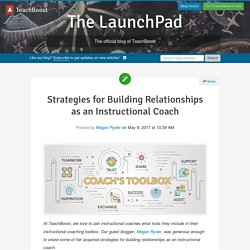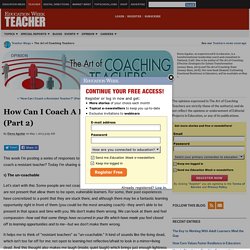

5 Tips To Become A Mathematics Coach feat. Georgina Rivera 3.25.2020. The Myth of Walkthroughs: 8 Unobserved Practices in Classrooms - Peter DeWitt's Finding Common Ground. Instructional Coaches Got Game. The 23 Artisan Themes. An artisan is one skilled in the applied arts, a craftsperson… a unique combination of artist, scientist, and skilled laborer.

Themes that describe the technical work of teaching. Clear Learning Goals. The ability of the teacher to identify and precisely express what students will know and be able to do as a result of a lesson. Congruency. The ability of the teacher to design classroom activities that are accurately matched to clear learning goals. Task Analysis. Diagnosis. Overt Responses. Mid-Course Corrections. Themes that describe the scientific aspects of teaching. Conscious Attention. Chunking. Connection. Why We Need to See Each Other Teach. Why Teacher-Driven Coaching Looks Different for Every Learner.
Recently, my school district—like many across the country—has begun to explore ways to increase students’ technology use in thoughtful ways, especially at the middle and high school level.

Taking the idea from theory to practice is something that takes a lot of work, and classroom teachers can sometimes benefit from extra support to make this successful transition. James, a secondary teacher in his third year, was one of many teachers considering what this might look like for the students in his classroom. At first, James found thoughtful tech integration a particular challenge, given the high demands that teaching already made on his time. Initially, he shared that he felt energized by new ideas, but they quickly became overwhelming. Early on, he tried to introduce more technology, but the sight of so many of his students clicking through their school day wasn’t the instruction he had initially envisioned. The first step in this process is to meet. 5 Relationship-Building Tips for Instructional Coaches. A classroom teacher makes a dozen decisions a minute, keeps lists of to-dos that reach the double digits, and—as a result of all that work—rarely purposefully takes time to develop relationships with other teachers.

This is why many of us who step into the role of instructional coach struggle to find that familiar productive feeling at first: We know that building relationships with teachers is essential, but we’re so accustomed to crossing 17 items off our to-do lists before 8 a.m. that a chat in the teachers’ lounge over a doughnut seems indulgent. But the truth of the matter is, we can’t get anywhere with teachers unless they trust us and know we’re down-to-earth humans whose true goal is to support them and their students. With Bug-in-Ear Coaching, Teachers Get Feedback on the Fly. Coaches and teachers Jacqueline Willis (left), and Kristi Blackburn observe Angela Ledford, a teacher at Clyde Elementary School, teach her 3rd grade reading class in Clyde, N.C. With Bug-in-Ear Coaching, Teachers Get Feedback on the Fly. What Works for Teacher Math Coaching? A First Attempt to Find Out. A few months back, my colleague Madeline Will wrote about exciting evidence that teacher coaching, as a form of professional development, can indeed improve student learning.

One of the open questions about coaching, however, has to do with the nitty-gritty details of the programs: Is online coaching as effective as face-to-face? How does coaching an early grades reading teacher differ from, say, a secondary math one? Now, two of the top researchers are chipping way at some of these conceptual questions, hoping to find out more about which contexts and structures best support effective coaching. And in a new study, they find promise in an online model they've developed for math teachers—but not a silver bullet.
In a random-assignment, they found significant changes to teacher practices thanks to the online coaching program, but the coaching didn't immediately translate into improved student test scores. Building a Math Coaching Program And the meta-analysis was limited in other ways. 2015337. Coaches Engage with Principles to Actions - National Council of Teachers of Mathematics. Strategies for Building Relationships as an Instructional Coach. At TeachBoost, we love to ask instructional coaches what tools they include in their instructional coaching toolbox.

Our guest blogger, Megan Ryder, was generous enough to share some of her acquired strategies for building relationships as an instructional coach. Before becoming an instructional coach I was a classroom teacher for seven years. As a new coach, I came to realize that not only is building relationships one of the most important steps to coaching and collaborating with teachers, but that it doesn’t happen overnight either.
Now that I’ve been in schools for a few years, I have moved from building relationships to maintaining them with a majority of the staff. While there are new staff members who I start relationships with every year, for the most part I have worked hard to make connections that allow for more meaningful coaching interactions. At the beginning of the school year, I remind the teachers where they can find me when I am not working with a teacher in a classroom. Kraft blazar hogan 2017 teacher coaching meta analysis wp. A Coach for Every Teacher. A Coach for Every Teacher.
Education Week. This week I'm posting a series of responses to the most common question I received: How can I coach a resistant teacher?

Today I'm sharing some of my thoughts on this challenge. 1) The un-coachable Let's start with this: Some people are not coachable. For some teachers and leaders, the conditions are not present that allow them to be open, vulnerable learners. Education Week. Education Week.